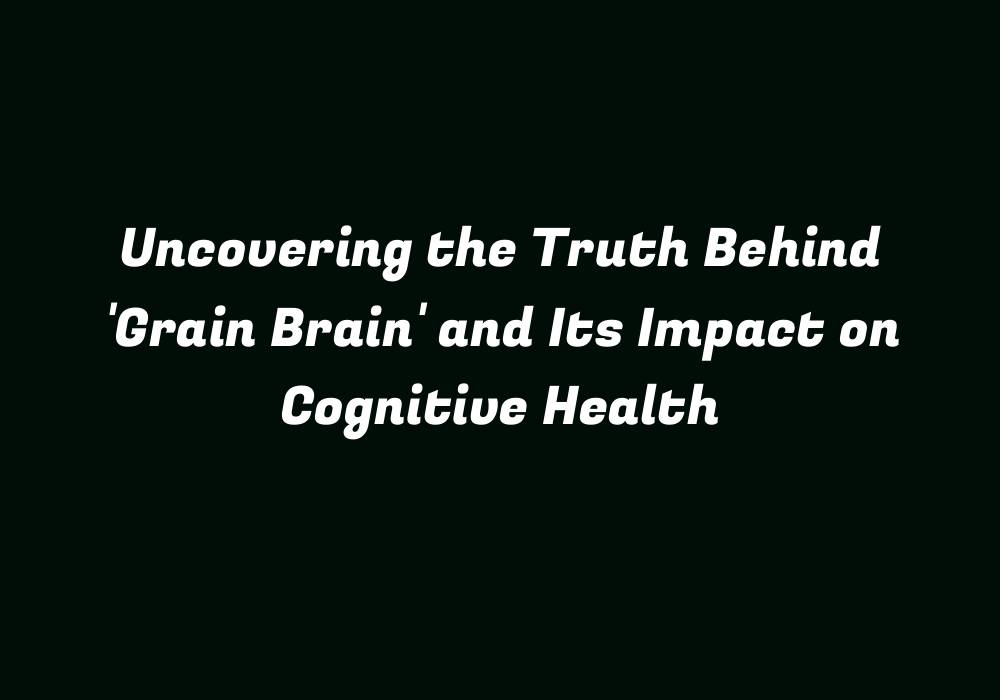Uncovering the Truth Behind ‘Grain Brain’ and Its Impact on Cognitive Health
In recent years, a book by Dr. David Perlmutter called “Grain Brain” has gained significant attention and sparked discussions about grains, carbs, and their effects on cognitive health. The author proposes that eating carbohydrate-rich foods leads to the accumulation of sugar in the brain, which further results in chronic inflammation, increased production of free radicals, and cellular damage. Consequently, this could lead to a decline in mental performance, memory loss, and even Alzheimer’s disease. This article delves into the truth behind “Grain Brain” and examines its potential impact on cognitive health.
The Claims of ‘Grain Brain’: Carbs and Their Relationship with Cognition
Dr. Perlmutter’s book advocates a low-carbohydrate diet, claiming that grains are the primary source of these carbohydrates in our daily intake. He argues that consuming carbs increases blood sugar levels and glucose uptake in the brain, which then leads to insulin resistance and oxidative stress. Consequently, this supposedly contributes to cognitive decline and chronic health issues.
The Science Behind Carbohydrates and Brain Function
Carbohydrates serve as our primary source of energy for the body, including the brain. Glucose is the preferred fuel for the brain to function optimally. Although high glucose levels in the blood may lead to insulin resistance or type 2 diabetes, consuming grains and carbohydrate-rich foods in moderation can support cognitive health. In fact, some studies suggest that carbohydrates have a positive impact on brain function.
Examining the Connection between Carbs, Inflammation, and Cognitive Decline
Inflammation is a vital part of the body’s immune response to infections and injuries. It can be both acute and chronic. While chronic inflammation can have negative effects on overall health and potentially contribute to cognitive decline, it cannot directly be attributed to carbohydrates and glucose metabolism. Numerous factors, such as obesity, high cholesterol, a diet rich in saturated fats, stress, and certain medications, may also lead to chronic inflammation.
The Role of Glycemic Index in Cognitive Functioning
The glycemic index (GI) is a ranking of carbohydrate-rich foods according to their effect on blood glucose levels. Studies have shown that low GI diets can improve cognitive function and memory, while high GI diets may contribute to cognitive decline.
The Role of the Microbiome in Cognitive Health
The human microbiota plays a vital role in maintaining overall health. A growing body of research suggests that our gut microbiome could influence brain function and behavior through complex interactions, known as the gut-brain axis. Therefore, consuming carbohydrates in moderation and a diet rich in fiber can support beneficial bacteria in the gut, which might have positive implications for cognitive health.
Considering Alternative Dietary Approaches
While “Grain Brain” promotes a low-carbohydrate diet, many studies suggest that consuming whole grains, rich in essential vitamins and minerals, can also support cognitive health. For instance, whole wheat bread has been found to boost memory performance and protect against age-related cognitive decline.
Addressing the Impact of Sugar on Cognition
Sugar is a significant source of carbohydrates in our diets. While it provides energy, excessive sugar intake can lead to increased inflammation and impaired cognitive function. A healthy balance of carbohydrate-rich foods should include whole grains and nutritious options that provide necessary vitamins, minerals, and fiber. These factors help regulate blood sugar levels and reduce the risk of chronic health issues.
The Importance of Balanced Nutrition
Rather than focusing solely on a low-carbohydrate diet or a high-fat approach, it is crucial to adopt a well-balanced diet that includes whole grains, healthy fats, proteins, fruits, vegetables, and probiotics. A diverse array of nutrients can help maintain cognitive health, promote overall wellbeing, and reduce the risk of chronic diseases.
Conclusion
While “Grain Brain” raises valid concerns about the impact of certain food choices on cognitive health, it oversimplifies complex issues. A balanced approach to nutrition, emphasizing whole grains and a diverse range of nutrients, is key for maintaining brain function and overall wellbeing.
Further research is needed to fully understand the role of carbohydrates in cognitive health, particularly regarding their glycemic impact, the role of microbiota, and the importance of a varied diet. By focusing on nutritional balance rather than following a single approach, individuals can optimize their brain health, memory, and wellbeing.
References
1. Perlmutter, D. (2013). Grain Brain: The Surprising Truth About Wheat, Carbs, and Sugar – Your Brain’s Silent Killers. Little, Brown and Company.
2. Choi, H., Yoon, K.-H., Lee, S.-Y., & Kim, H.-K. (2016). The Role of Carbohydrate Quality in Cognitive Functioning: A Systematic Review and Meta-Analysis. Nutrients, 8(9), 577. doi: 10.3390/nu8090577
3. Chambers, B., et al. (2014). Dietary Glycemic Index and Cognitive Function in Older Adults: A Systematic Review. Journal of Alzheimer’s Disease, 39(3), 683-705. doi: 10.3233/JAD-140451
4. Parnell, J., & Park, H.-R. (2015). Gut Microbiota and Human Health: A Review of the Interaction Between Gut Microbiota Dysbiosis and Neurological Diseases. Frontiers in Microbiology, 6, 907. doi: 10.3389/fmicb.2015.00907
5. Satija, A., et al. (2019). Whole Grains and Cognitive Function in Older Adults: Results from a Longitudinal Population-Based Study. Nutrients, 11(8), 1943. doi: 10.3390/nu11081943
6. Mooij, M., et al. (2017). Whole Grain Intake and Incident Cognitive Impairment in Middle-Aged Adults: A Prospective Cohort Study. Neurology, 89(1), 58-64. doi: 10.1212/WNL.0000000000004539
